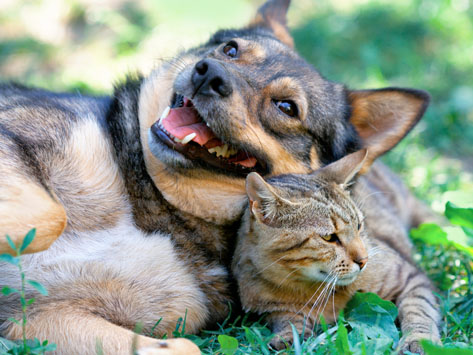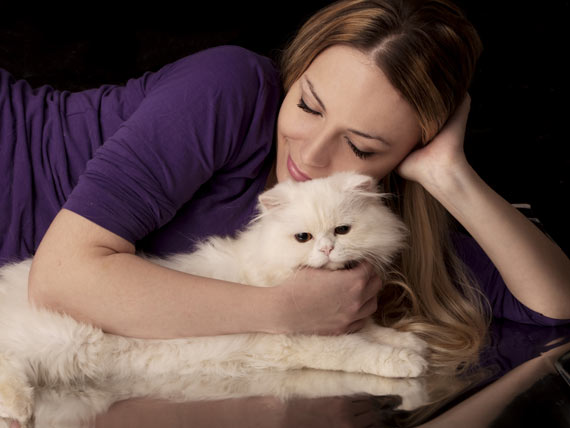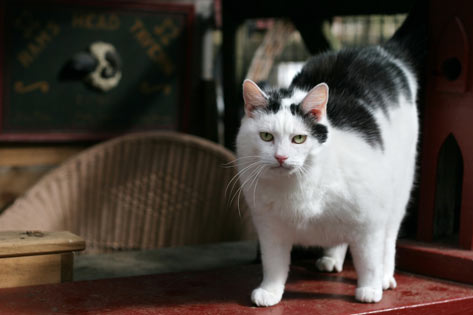Having a pet bunny can prove to be an exciting and fun addition to your life. Before getting a bunny rabbit, be sure that you have the time, space and ability to care for your bunny. Rabbits can live up to 10 years or more, so just like having a puppy, having a rabbit is a big responsibility.
Once you've decided that you want a bunny rabbit, getting your home ready for your new pet is a fairly simple process. You'll need a rabbit cage that is at least four times the size of your rabbit - the bigger the better. ASPCA guidelines stipulate that a rabbit enclosure for a single small or medium breed needs to be at minimum four feet wide, two feet high and two feet deep. Most pet stores sell rabbit cages that are too small, so you'll either want to search for a larger rabbit cage, or use a dog cage depending on the size of the area you have for your rabbit. Make sure that the cage either has a solid floor, or if you have to get a cage with a wire floor, that you put something hard and flat down on top of the wire for the rabbit to stand on. Wire floored cages can cause sore hocks because of a rabbit's fragile feet.
You'll also need bedding for the rabbit when it's in the cage. The best type of litter or bedding for a bunny rabbit is organic or paper-based because it's absorbent while also being very safe for your bunny. Avoid cedar and pine shavings and clumping litter, as these can harm your rabbit.
Feeding is also a very important part of taking care of your bunny rabbit. While it may be easiest to feed your bunny pellets, this is not the best rabbit diet. Combine fresh leafy green vegetables like spinach, romaine lettuce, broccoli, carrot tops and endive with pellets and hay for a complete and balanced diet. Baby rabbits should be given alfalfa because it is high in calories, protein and calcium. Adult rabbits can be fed timothy, oat hay or orchard grass. Buy hay at pet stores, or at your local farm. All bunny rabbits also need fresh water daily.
Just like any other pet, bunny rabbits like to play with toys. Having toys available and getting plenty of exercise will extend the life of your rabbit, and also keep them from being bored and complacent. Bunnies like toys that they can chew on, like hard plastic baby toys, large rubber balls, cat toys that can be tossed, toys with ramps, a box full of shredded paper, things to jump on and much, much more. You can be creative with the toys that you give your bunny as long as they are clean and safe. If you find that your rabbit is chewing and eating any type of toy, switch to a different toy that it is not interested in eating.
If you're going to let your bunny rabbit roam around your home outside of its cage, be sure that you have "bunny proofed" your house by securing and hiding any cords, providing enough toys so that the bunny won't chew on baseboards or furniture, making sure curtains are not full length to the floor, closing off any "off limits areas" and securing any cleaning products or other dangerous materials. Letting a bunny rabbit roam around your house is a great way to let your bunny get exercise.

 Can Cats and Dogs Live Peacefully Together?
Can Cats and Dogs Happily Coexist in the Same
Can Cats and Dogs Live Peacefully Together?
Can Cats and Dogs Happily Coexist in the Same
 Cat Scratching - How To Stop Your Cat Scratching The Furniture
Cat Scratching - How To Stop Your Cat Scratching The Furnitu
Cat Scratching - How To Stop Your Cat Scratching The Furniture
Cat Scratching - How To Stop Your Cat Scratching The Furnitu
 Choosing the Perfect Cat Name
The expected arrival of a cat in the house is
Choosing the Perfect Cat Name
The expected arrival of a cat in the house is
 Why Your Cat's Weight Really Matters
Weight Isn’t Just a Cosmeti
Why Your Cat's Weight Really Matters
Weight Isn’t Just a Cosmeti
 Obesity in Cats... and What to do About an Overweight Cat
Ever wonder what to do about your overweigh
Obesity in Cats... and What to do About an Overweight Cat
Ever wonder what to do about your overweigh